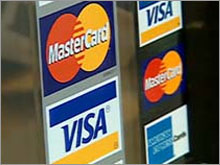 |
|
|
|
|
|
|
|
|
| Concerned about ID theft?
|
|
|
|
|
NEW YORK (CNNMoney.com) – Chase wants you to 'Blink' when buying a latte. MasterCard wants you to 'Tap and Go' your double cheeseburger. American Express will let you ExpressPay for just about anything.
For consumers, it's getting a little confusing...what's wrong with just swiping a debit or credit card which everyone seems to have gotten pretty comfortable with?
What all these financial institutions want you to do is use "contactless payment technology," which is a microchip and an antenna implanted in anything from a credit card to a small reader on a key chain. They're pushing hard -- one could even be in the mail to you right now.
"It's in its infancy, " said Laura Kaster, an analyst at Sandler O'Niell & Partners who covers American Express. "But everyone is going to try to move toward this."
Proponents say it will save time for consumers and could make money for merchants.
The technology works similar to a bar code. When you get to the register you just scan the device over an electronic reader, which sends the information to your bank or payment center to either approve or deny the purchase. You don't have to hand a teller your card, there's no password to enter and, depending on the merchant, it may not even require a signature.
Total time saved: About 40 percent faster than the average transaction currently, according to Art Kranzley, an executive at MasterCard.
"Customers want simplicity and convenience," he said.
Who Blinks and wins
Like other credit card purchases, card companies will make their money from processing fees charged to merchants. So the more people use cards instead of cash, the more money they make.
Kranzley also said customers tended to keep cards with contactless technology within easy reach, something he described as a "top of the wallet effect," which means they use it more for traditional swipe purchases as well.
Some banks will require you to sign up for the service while others will just incorporate it into all new debt and credit cards.
It's hard to say how many contactless-equipped devices are out there, as many payment centers won't release that information. But American Express says the technology comes standard on all of its Blue cards, which it says are "very popular." Chase said it has issued three to five million and Visa says it has 3.5 million such devices worldwide.
The technology's acceptance is growing at national retailers. A MasterCard spokeswoman said over 20,000 stores now take its PayPass version, including certain 7-Eleven, McDonald's and CVS locations.
While customers may be happy about spending less time in line and not having to deal with a pocket full of change, for retailers the technology carries a tangible benefit.
"It's those incremental time savings that these merchants are looking for," said Ed Groshans, an analyst that covers American Express for brokerage firm Fox-Pitt Kelton. "They may lose sales if the lines are too long."
The ease of payment has raised questions as to how easy it would be for thieves to steal your card or information.
One analyst said there will be more chances for fraud just by having more card readers in circulation, readers that could be tampered with in order to direct credit card information to a thief and not the bank.
"There will be more security holes," said Avivah Litan, security analyst for Gartner, a research institute. "In the end, it increases the risks not decreases them."
But Groshans said the chances for fraud may be reduced by eliminating the need to hand over a card to a cashier, who could then copy it.
MasterCard, American Express and Visa, which offers the Visa Contactless feature, said all the information sent via the airwaves is encrypted and other monitoring measures are in place, such as cross referencing charges to stores to make sure they accept contactless technology.
They also stress that, as with conventional cards, customers are not liable for purchases made on a lost or stolen card.
But regardless of the security precautions or of the actual vulnerability of the technology, its success may rest more on how safe people perceive it to be.
"This identity theft has really gotten people thinking about what kinds of information they want made available," said Richard Feingberg, professor of retail management at Purdue University.
Feingberg didn't comment on the technology's security, but he said companies could suffer a backlash if they issue cards that people don't want or don't understand.
"Customers have choices, they can cut up their credit cards," he said.
___________________________
Cash or plastic? How about fingerprint? Biometric transactions are faster and more convenient -- and closer than you may think. Click here.
Study finds ID theft fears may be hype. Click here
Bank robbery? Survey finds steep charges for using cash machine at a bank where you don't have an account. Click here

|